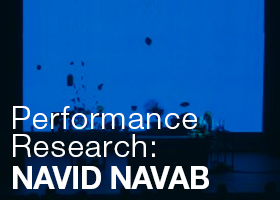PhD Program in Critical Studies in Improvisation

As a mode of being in the world, improvisation shows us that there are other ways of doing things, that social change is possible, that another world is possible.
— Fischlin, Heble, & Lipsitz (The Fierce Urgency of Now, pg. 243)
About the Program
The new interdisciplinary graduate program in the field of Critical Studies in Improvisation (IMPR) offers PhD Degrees incorporating foundations in critical inquiry, multidisciplinary improvisatory practices, performative agency, and community engagement, built on years of award-winning, arts-based research and training by the International Institute for Critical Studies in Improvisation (IICSI). Through study and experiential learning opportunities, students will gain broadly applicable practical skills in research and project development, management and implementation, leadership, and collaboration.
Primary and Secondary Areas of Focus
Primary Area (Critical Studies in Improvisation):
Involves an intensive literature review, preliminary thesis research focus development, and presentation at the Graduate colloquium.
Secondary Area (SA):
An opportunity to develop disciplinary expertise (particularly useful for those who seek academic employment), breadth, and pedagogical design experience. Students extend the particular vocabulary and research focus of Critical Studies in Improvisation in relation to other disciplinary engagements. Outcomes include the development and design of specific courses in the Secondary Area including critique and response from faculty advisors.
We strongly encourage prospective candidates to reach out to potential faculty mentors to discuss the program and their research interests.
Skills and Applications
Through this program, students will acquire crucial transferable skills with broad relevance and application across a range of fields. These include:
- Critical thinking
- Improvisational skills
- Collaborative competencies
- Project management experience
These skills will enhance students’ effectiveness in academic, scholarly, artistic, business, and grassroots community contexts. They also maximize graduates’ expertise and employability not only in the field of education, but in areas such as:
- Research, writing, and public administration
- Policy analysis and communications
- Government and non-government organizations
- Not-for-profits, community leadership, arts programming and administration
- Artistic practices across digital, traditional, and emergent media
Unique Opportunities in Practice-Based Research

The PhD program in Critical Studies in Improvisation provides students with distinctive practice-based research opportunities. These initiatives bridge rigorous academic inquiry with creative and community-oriented practices, enabling students to address real-world challenges through innovative approaches. As part of this program, students will:
- Engage in hands-on research projects that incorporate arts-based methodologies.
- Collaborate with community partners to create meaningful social impact.
- Present findings at graduate colloquia and international conferences, receiving valuable feedback to refine their work.
- Build a robust portfolio of research and creative work that highlights interdisciplinary expertise.
This unique blend of academic and practice-based learning equips graduates with the skills and experiences needed for diverse careers in academia, arts administration, public policy, and community leadership.
Program Overview: PhD in Critical Studies in Improvisation

The PhD in Critical Studies in Improvisation at the University of Guelph is a transformative four-year, in-person program that blends rigorous academic research with arts-based community engagement. This interdisciplinary program emphasizes improvisation as a powerful tool for social change, fostering innovative research and creative methodologies.
Students engage in coursework, qualifying exams, and a dissertation while developing expertise in their primary area of Critical Studies in Improvisation and a complementary secondary field. This balanced approach prepares graduates for diverse academic and professional opportunities.
Coursework: Core classes include Core Concepts in Critical Studies in Improvisation (IMPR*6010) and Arts-Based Community Making (IMPR*6020), complemented by the innovative Pedagogy Lab (IMPR*6410).
Qualifying Exams: Assess expertise in the primary and secondary areas, ensuring readiness for dissertation work.
Thesis and Dissertation: Students design and defend original research that makes a significant contribution to improvisational studies.
Graduate Colloquium: A platform to present and refine research, receiving valuable feedback from faculty and peers.
The program’s interdisciplinary focus and community-oriented initiatives create a dynamic learning environment, preparing students for impactful careers in academia, the arts, and beyond. Visit the Graduate Calendar for more information on the program courses.
Collaborative International Development Studies (IDS) Designation
The PhD program in Critical Studies in Improvisation offers an exciting opportunity to specialize in International Development Studies (IDS). This collaborative specialization, designated as PHD.IMPR+IDEV, allows students to explore interdisciplinary development theories and conduct impactful research on international development.
Combining the IDS designation with your PhD equips you with essential qualifications for the academic job market and provides the interdisciplinary perspective required for careers in development policy and practice.
What You’ll Study
- Core PhD requirements in Critical Studies in Improvisation.
- Interdisciplinary courses on development theories, debates, and research methods.
- Practical training in development research methods and their applications.
Completion of the IDS collaborative specialization adds the official designation "International Development Studies" to your PhD degree, signaling your interdisciplinary expertise in this vital field.
For more information, visit the IDS website or email the IDS PhD Program.
How to Apply
Our PhD in Critical Studies in Improvisation welcomes candidates from a wide range of academic and artistic backgrounds. Before you begin, please review the steps and requirements below. All application materials are due by January 31 of the anticipated entrance year.
Applicants should have a four-year Bachelor’s degree (or equivalent) with a minimum GPA of 75% in a related field. Candidates may enter directly from an Honours BA or already hold a Master’s degree.
We also consider applicants who lack traditional academic credentials but have relevant expertise or practitioner experience. Such candidates may need to provide a portfolio, research proposal, or additional documents, and may be interviewed. Further preparatory courses may be required. Contact us if you have questions about eligibility.
Step 1: Online Application (OUAC)
Complete the University’s Online Application. Provide two referees’ names and pay the CDN $110 fee. Within five business days, you’ll receive instructions for uploading documents to WebAdvisor.
Step 2: Submit Documents to WebAdvisor
Use WebAdvisor to upload required documents (e.g., transcripts, English proficiency scores). If official transcripts are requested via OUAC, do not upload them again.
Step 3: Submit Materials to SlideRoom
Upload the following to the SlideRoom Portal (USD $10 fee):
- 3-page Statement of Research
- CV (including two references)
- Portfolio of creative/scholarly work
- Writing Sample (e.g., essay, article, or chapter)
You may edit your portfolio until you submit. After that, no changes are allowed.
Additional Guidelines
Statement of Research: Provide a 3-page proposal outlining your research focus, its alignment with Critical Studies in Improvisation, and your preparation for this program. Highlight methodologies, potential advisors, and connections to existing scholarship. Non-traditional applicants may emphasize practitioner experience and its relevance.
CV: Summarize academic, professional, and artistic experiences—e.g., performances, exhibitions, publications, and grants. Include referees’ names and affiliations at the end.
Portfolio: Showcase your most relevant work (audio, video, images, writing) that illustrates your engagement with improvisation. Follow SlideRoom’s format and size guidelines, and connect each piece to your research interests.
Writing Sample: Submit a scholarly work that demonstrates your research ability, critical thinking, and academic writing skill. Avoid full books or lengthy manuscripts.
For questions about the application process, please contact imprgpc@uoguelph.ca.
We encourage applications from international students. If your first degree was completed in a non-English speaking country, you must provide proof of English language proficiency at the time of application.
Accepted Assessments:
- TOEFL (paper-based): 550 minimum
- TOEFL (iBT): 89 overall, no score below 21
- IELTS: 6.5 overall
- MELAB: 85
- CAEL: 60
International applicants should budget between $18,000 and $25,000 CAD per year for living and studying in Canada. While financial assistance is typically available, it may only cover part of these costs. Please consult the University’s Centre for International Programs for more information, and review the International Graduate Student Funding Guidelines.
All international students and their dependants must enroll in the University Health Insurance Plan (UHIP) upon arrival in Ontario.
Funding & Fees
Our PhD program in Critical Studies in Improvisation provides guaranteed funding packages and a range of additional financial support options.
Stipends & Assistantships
- Baseline package: 12 Graduate Teaching Assistantships (GTAs) and/or Graduate Student Assistantships (GSAs) plus University Graduate Scholarship (UGS) funding over four years.
- Opportunities for Graduate Research Assistantships (GRAs) supported by faculty grants.
- Internships with community partners for hands-on experience.
- In some cases, a Sessional teaching appointment may replace one GTA in Year 3 or 4.
International Doctoral Tuition Scholarship (IDTS)
All eligible international PhD students receive the IDTS, valued at $11,000 per year for up to four years. This covers the difference between international and domestic tuition. Students admitted with at least an 80% (A-) average qualify immediately, while others become eligible after passing their qualifying exam.
Full eligibility details. (Note: IDTS applies only to PhD students.)
ACCESS Awards & Bursaries
The University of Guelph offers ACCESS awards for students with financial need. Complete a needs assessment with Student Financial Services. Additional competitive research scholarships are also available. For more details, see the Faculty of Graduate Studies calendar.
External Scholarships & Grants
- Ontario Graduate Scholarship (OGS): Apply before admission. Deadlines and details.
- Social Sciences and Humanities Research Council (SSHRC): Canadian citizens/permanent residents are encouraged to apply prior to admission. Review deadlines and requirements.
For additional awards and scholarships, visit the Graduate Studies funding page.
Tuition & Fees
For detailed information on tuition and fees, Cost of Tuition/Living.
Contact Information
Critical Studies in Improvisation
Graduate Program Coordinator:
Professor James Harley
Email: IMPRGPC@uoguelph.ca
Visit James' Profile
Program Chair:
Professor Andrew Bailey
Email: artsadr@uoguelph.ca
Visit Andrew's Profile
International Institute for Critical Studies in Improvisation
Director:
Assistant Professor Eric Fillion
Email: efillion@uoguelph.ca
Visit Eric's Profile
Project Manager:
Julia Busatto
Email: improv@uoguelph.ca
Visit Julia's Profile
The International Institute for Critical Studies in Improvisation (IICSI) is a partnered research institute hosted at the University of Guelph, with collaborations across eight academic institutions and over 65 community-based organizations. The institute’s mandate is to create positive social change through improvisational arts, scholarship, and collaborative action.
Visit the IICSI Website for more details and a full list of partners and team members.
 |
 |
 |